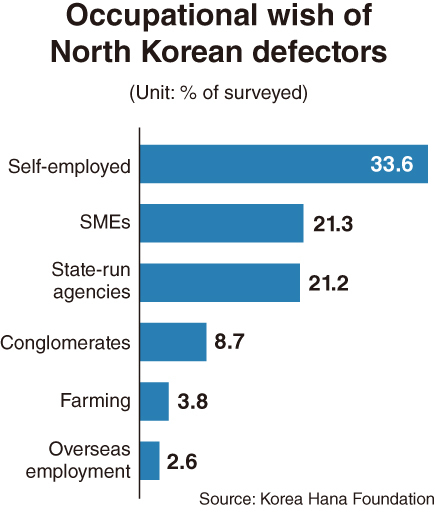[News Focus] 1 in 3 N. Korean refugees wants to be self-employed
But jobs, pay in South fall far short of expectations
By Kim Yon-sePublished : March 18, 2021 - 16:04

SEJONG -- Unlike most people born in South Korea, defectors from North Korea expressed a strong preference for self-employment in a 2019 survey.
According to Statistics Korea and the Korea Hana Foundation, 33.6 percent of the North Korean defectors said they would like to run their own businesses in the South. The annual poll was conducted by the foundation, and the results are the most recent available.
Those who expressed hope of becoming self-employed made up the largest portion of respondents, both for men (33.3 percent) and women (33.7 percent). The same preference was apparent across generations, from those in their 20s to those in their 60s.
It was particularly strong among defectors in their 40s (37.4 percent) and among those residing in Seoul (39.8 percent).
Employment at small and midsized enterprises was the second-most-popular choice, with 21.3 percent of the defectors expressing a preference for it.

Neither career path tends to rank high on the wish lists of native-born South Koreans, particularly those in their 20s and 30s.
The third- and fourth-most-popular career choices for defectors were at state-funded agencies, with 21.2 percent of respondents picking this option; and at conglomerates, selected by 8.7 percent of respondents. Careers with state-funded agencies and conglomerates are the top two choices among people born in South Korea.
Next on the list were farming (3.8 percent), overseas employment (2.6 percent) and working at foreign companies operating in South Korea (1.7 percent).
Actual outcomes for defectors tend not to reflect the preferences expressed in the survey. As of 2019, the highest proportion of defectors, 24.3 percent -- 23 percent of men and 24.8 percent of women -- were engaged in simple forms of labor such as moving or packing products, according to another study by the Korea Hana Foundation.
The next-highest proportion, 19.6 percent -- 3.9 percent of men and 26.3 percent of women -- found employment in the services industry.
The average monthly wage for defectors stood at 2.04 million won ($1,806) in 2019, and there was a wide gender gap with men averaging 2.77 million won and women just 1.75 million won.
The largest group, 34.1 percent of those in the study, brought in between 2 million won and 3 million won per month.
Next were those making monthly salaries between 1.5 million won and 2 million won (26 percent), and those bringing in 3 million won or more per month (16 percent).
Nearly 1 in 4 defectors (23.9 percent) were paid less than 1.5 million won per month. While only 7.1 percent of men fell into this category, 30.6 percent of women did. Further, 14.1 percent of women earned less than 1 million won per month.
The average wage for a female defector (1.75 million won) was about minimum wage, which stood at 8,350 won per hour as of 2019 and translates to a monthly salary of 1.74 million won for a full-time worker.
A labor researcher said many defectors are paid less than that. “This means employment as part-timers or temporary workers with nonregular job status.”
He also suggested that some defectors may have been treated poorly even if they held regular, full-time jobs.
The growth of the average monthly wage for female defectors was meager -- 1.53 million won in 2017 to 1.65 million won in 2018 and 1.75 million won in 2019 -- while the minimum wage climbed sharply from 1.35 million won in 2017 to 1.57 million won in 2018 and 1.74 million won in 2019.
Women make up nearly 70 percent of the 35,000 defectors from North Korea.
Statistics Korea data showed that the employment rate for defectors stood at 58.2 percent in 2019, below the average of 60.8 percent for all South Koreans for the corresponding year. This was true for both men and women.
By Kim Yon-se (kys@heraldcorp.com)







![[Graphic News] More Koreans say they plan long-distance trips this year](http://res.heraldm.com/phpwas/restmb_idxmake.php?idx=644&simg=/content/image/2024/04/17/20240417050828_0.gif&u=)
![[KH Explains] Hyundai's full hybrid edge to pay off amid slow transition to pure EVs](http://res.heraldm.com/phpwas/restmb_idxmake.php?idx=644&simg=/content/image/2024/04/18/20240418050645_0.jpg&u=20240419100350)





![[From the Scene] Monks, Buddhists hail return of remains of Buddhas](http://res.heraldm.com/phpwas/restmb_idxmake.php?idx=652&simg=/content/image/2024/04/19/20240419050617_0.jpg&u=20240419175937)

![[KH Explains] Hyundai's full hybrid edge to pay off amid slow transition to pure EVs](http://res.heraldm.com/phpwas/restmb_idxmake.php?idx=652&simg=/content/image/2024/04/18/20240418050645_0.jpg&u=20240419100350)

![[Today’s K-pop] Illit drops debut single remix](http://res.heraldm.com/phpwas/restmb_idxmake.php?idx=642&simg=/content/image/2024/04/19/20240419050612_0.jpg&u=)